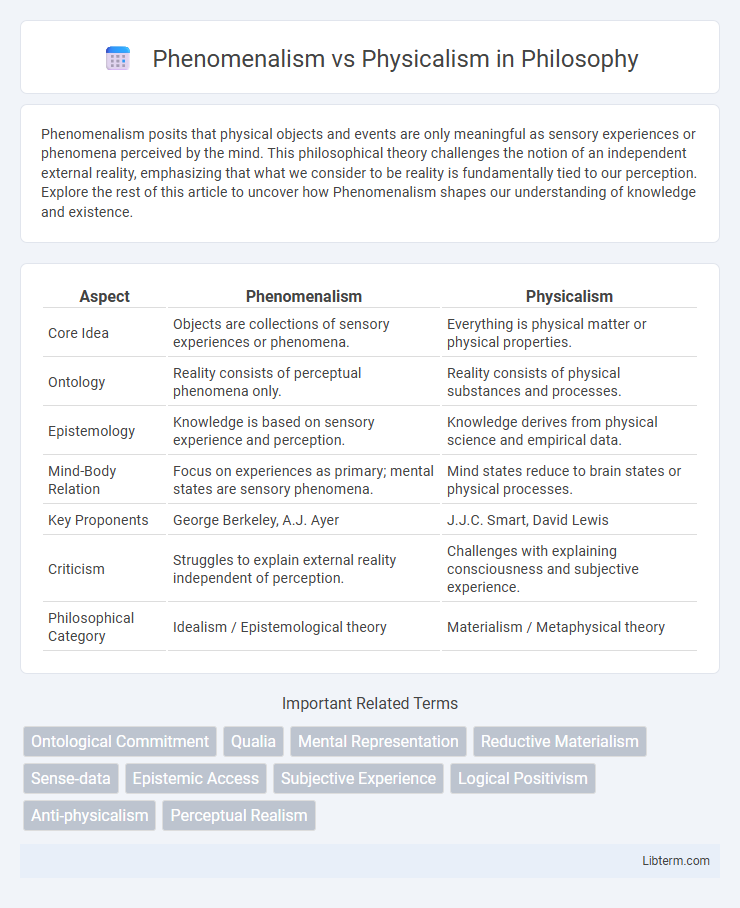Phenomenalism posits that physical objects and events are only meaningful as sensory experiences or phenomena perceived by the mind. This philosophical theory challenges the notion of an independent external reality, emphasizing that what we consider to be reality is fundamentally tied to our perception. Explore the rest of this article to uncover how Phenomenalism shapes our understanding of knowledge and existence.
Table of Comparison
| Aspect | Phenomenalism | Physicalism |
|---|---|---|
| Core Idea | Objects are collections of sensory experiences or phenomena. | Everything is physical matter or physical properties. |
| Ontology | Reality consists of perceptual phenomena only. | Reality consists of physical substances and processes. |
| Epistemology | Knowledge is based on sensory experience and perception. | Knowledge derives from physical science and empirical data. |
| Mind-Body Relation | Focus on experiences as primary; mental states are sensory phenomena. | Mind states reduce to brain states or physical processes. |
| Key Proponents | George Berkeley, A.J. Ayer | J.J.C. Smart, David Lewis |
| Criticism | Struggles to explain external reality independent of perception. | Challenges with explaining consciousness and subjective experience. |
| Philosophical Category | Idealism / Epistemological theory | Materialism / Metaphysical theory |
Introduction to Phenomenalism and Physicalism
Phenomenalism asserts that physical objects and events are reducible to sensory experiences or phenomena, emphasizing that reality consists fundamentally of perceptual data. In contrast, Physicalism posits that everything is fundamentally physical, grounded in material entities and processes described by natural sciences, independent of subjective experience. These positions offer contrasting ontologies: Phenomenalism centers on perceptual phenomena as the basis of reality, while Physicalism upholds a materialist framework where the physical constitutes the ultimate substance.
Defining Phenomenalism: Core Principles
Phenomenalism asserts that physical objects are reducible to sensory experiences or phenomena, emphasizing that the existence of objects depends on perceivable qualities. Core principles of phenomenalism include the idea that knowledge of the external world is mediated entirely through sensory data, making unperceived objects logically contingent on potential perceptions. Unlike physicalism, which posits an objective, mind-independent reality composed of physical matter, phenomenalism locates reality within experiential perception and the structure of sensory information.
Understanding Physicalism: Key Concepts
Physicalism asserts that everything in the universe, including mental states and consciousness, is fundamentally physical and can be explained by physical processes and entities. Central concepts include the principle of supervenience, where mental properties depend on physical properties, and the notion that all phenomena are ultimately reducible to physical explanations, such as neurobiological functions. This perspective contrasts with phenomenalism by emphasizing objective physical reality rather than subjective experience as the basis of existence.
Historical Background and Philosophical Roots
Phenomenalism, originating from George Berkeley's immaterialism and later developed by British empiricists like John Stuart Mill, posits that physical objects are reducible to sensory experiences or phenomena. Physicalism, rooted in the scientific revolution and philosophical materialism championed by thinkers such as Thomas Hobbes and later logical positivists, asserts that everything is physical or supervenes on physical substances. The historical debate traces back to early modern philosophy's struggle between idealism and materialism, shaping contemporary metaphysical discourses on the nature of reality and consciousness.
Major Arguments for Phenomenalism
Phenomenalism argues that physical objects do not exist independently of sensory experiences, asserting that all knowledge of the physical world is fundamentally grounded in perceptual phenomena. Key arguments include the idea that physical objects are logical constructions derived from sensory data, supported by the claim that scientific observations confirm only the phenomena accessible to experience, not the objects in themselves. Phenomenalists also emphasize the mind-dependent nature of reality, contrasting with physicalism's commitment to a mind-independent material world.
Main Arguments Supporting Physicalism
Physicalism asserts that all phenomena can be explained by physical processes and properties, emphasizing the completeness of the physical sciences in describing reality. It argues that mental states are either identical to or fully dependent on physical states, supported by neuroscientific evidence linking brain activity with experiences. This position challenges phenomenalism by rejecting the notion that reality is solely dependent on perceptual phenomena, instead promoting an objective, observer-independent framework grounded in physical entities.
Comparative Analysis: Strengths and Weaknesses
Phenomenalism emphasizes the subjective experience of consciousness, providing a robust account of qualia but struggles with explaining the existence of an external world independently of perception. Physicalism offers a scientifically grounded framework by reducing mental states to physical processes in the brain, facilitating empirical validation, yet faces challenges addressing the explanatory gap and the hard problem of consciousness. The comparative analysis reveals Phenomenalism's strength in capturing experiential aspects while Physicalism excels in ontological parsimony and predictive power.
Implications for Consciousness and Perception
Phenomenalism emphasizes that consciousness and perception are fundamentally tied to sensory experiences, suggesting that physical objects only exist as phenomena perceived by the mind. Physicalism, by contrast, asserts that consciousness arises from physical processes within the brain, framing perception as a direct result of neural activity. The implications for consciousness involve a debate over whether subjective experiences can be fully explained by physical entities or if they represent an irreducible, perceptual reality.
Critics and Counterarguments
Phenomenalism faces criticism for its reliance on sensory experiences, which critics argue leads to subjective idealism and undermines the existence of a mind-independent reality. Physicalism counters by emphasizing that all phenomena, including mental states, are ultimately physical processes, supported by neuroscientific evidence linking brain activity to conscious experience. However, physicalism struggles with the "hard problem of consciousness," as it cannot fully explain subjective qualia, prompting ongoing debate and alternative theories like dual-aspect monism.
Conclusion: Bridging the Divide
Phenomenalism and physicalism present distinct views on the nature of reality, with phenomenalism emphasizing sensory experiences and physicalism grounding existence in physical entities. Bridging the divide requires acknowledging that conscious experiences emerge from physical processes while retaining their unique qualitative aspects. Integrative frameworks like property dualism or neutral monism offer promising approaches to reconcile subjective phenomena with objective physical structures.
Phenomenalism Infographic

 libterm.com
libterm.com